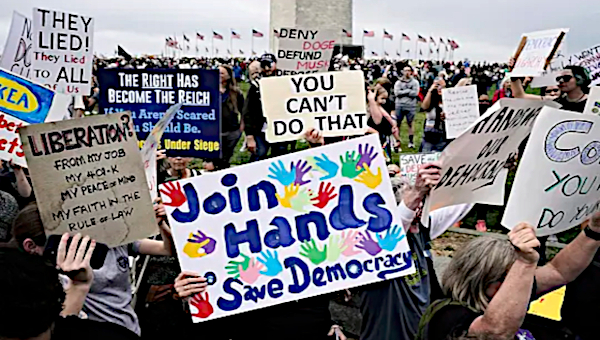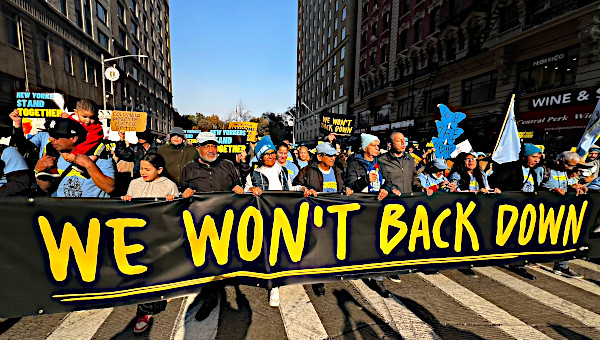US Election: What Could it Mean for Canada and the Canadian Left?
United States President Donald Trump represents a danger to working people, in particular those most marginalized, and a threat to relatively impoverished but critically important liberal democratic institutions and practices. Given the role and dominance of the US as the leader of international capitalism and principal imperialist hegemon in the world, a re-elected Trump threatens any real attempt at ending wars and the nuclear arms race, struggles for economic and political liberation, dealing with the COVID-19 pandemic and, perhaps most ominously, efforts to address the climate emergency.

Obviously, with the close interrelationships between Canada and the US, a Trump victory would (as the current administration does) affect us economically, socially and politically. The Trump phenomena also affects and is buoyed by critical contradictions within the US working class, that are analogous but not identical to similar class contradictions in Canada and across the globe.
But the US election is about more than Trump. Democratic challenger Joe Biden represents the centrist, neoliberal wing of the party, which, although being a premier sponsor of neoliberal globalization, does present potential opportunities to move the political envelope at least partially in another direction. In a number of ways, it could produce ambivalent effects on the Canadian Liberal government’s direction, reinforcing some of the more limited and problematic elements, as well as openings to pressure the latter.
Finally, the small but growing socialist movement in the US around the Democratic Socialists of America (DSA) and elsewhere, has engaged with electoral politics and the Democratic Party in different ways. This provides some food for thought for Canadian socialists.
Trump’s Monstrosities
Very few people on the Canadian left (and many Canadians in general) are neutral about the US presidential election, and rightly so. Aside from our sense of solidarity and concern with working people in the empire to the south, it is clear that what happens there affects what happens here, as well as around the world. The list of Trump’s dangers is long and ugly. He represents an authoritarian populist orientation and a movement that threatens to undo (or further water down) what remains of the American welfare state dating back to the New Deal. He is a climate change denier and a leader of that movement. His administration and campaign directly attacks the rights of Black and racialized people, immigrants, and the movements that have targeted repressive policing and other areas of systemic discrimination.
Trump undermines and seeks to dismantle public education, attacks the collective rights of working people and unions, and furthers an agenda that directly seeks to undo social rights gained by women and members of the LGBTQ community. He has packed the courts and regulatory agencies across the country with right-wing and evangelically-oriented ideologues, tied to various corporate and financial interests.
In the past year, there has also been a kind of a ‘third-wave Red Scare’ (American socialist Meagan Day coined this expression), calculated to build fear and hatred of socialists and even left liberals. Trump legitimates and appeals to nativist, violent, proto-fascist and racist militias and elements contemptuous of liberal democracy, threatening violent voter suppression and fraud. A re-elected Trump would deepen this environment of authoritarianism and violence. This is not to mention the disgusting display of ignorance and irresponsibility around the coronavirus pandemic, where more than 200,000 people have needlessly died or are living with various disabilities.
On the international level, Trump has kept up the defence of American corporate and financial interests, increasing military spending while stimulating hatred and xenophobia toward competitors such as China (albeit always looking for ways to protect market and investment access for US-based corporations and finance). And, keep in mind, even if Trump loses, he will not simply go away. The Republican right could anoint a leader with similar politics but none of the personality deformations of the billionaire president – someone more effective.
Trump’s Effects on Canada
One can go on ad infinitum to list the issues with Trump, his coterie and hangers-on in the Republican Party, and his supporters. But while Trump’s administration and domination of one of the two major political parties in the US is horrible enough for the American people – especially working class folks – his power, ideology, policies and social base threaten people in other countries, particularly Canada.
A Trump victory would embolden similar xenophobic and racist elements in Canada, like the Soldiers of Odin and the Proud Boys, each with roots and links in this country. It would appeal to and reinforce existing fear and hatred of immigrants and refugees.
A Trump win would also strengthen right-wing populist trends within elements of the Canadian working class (and the petit bourgeoisie) – trends that are characteristic of some people in working class communities around the Global North that have been victimized by the vicissitudes of capital mobility and neoliberalism. It is no accident that Trump gained support in the 2016 elections from communities in the so-called ‘Rust Belt,’ where many working class voters had cast their ballots for Obama in the previous two trips to the polls. Interviews with many of these folks show that without any real alternative, there is disgust toward the promises made by the Democratic establishment, and a corresponding openness to the demagogic promises, nativist tropes and downright racist myths, that Trump propagated.
Some of those communities are also tied to fossil fuel extraction, like coal, oil and gas as well as fracking. Trump promised to increase investment in high emitting industries, and demonized those who argued for moving off of and replacing carbon-based fuel.
Trump’s promises of manufacturing and extractive industry jobs have not come to fruition either. Various tariff initiatives have ended up helping certain sectors of capital, but haven’t rebuilt a new economic base for left-out workers. On the other hand, the unwillingness of the Biden-Harris grouping inside the Democratic Party to challenge capital mobility and the the power of finance in general – or to fully adopt and argue for the Green New Deal package proposed by the elements of the social democratic and socialist left – hardly provides a base to win these groups of workers against the incumbent (Harris and Biden’s defense of fracking in the televised debates was a sad example of this).
Canadian Conservative Party leader Erin O’Toole echoes certain elements of Trump’s appeal, especially to workers who have lost jobs in the auto sector, and to working class communities tied to oil and gas investments in Alberta and Saskatchewan. The provincial governments of the Prairie provinces, along with oil and gas investors, would be strengthened in their drive to have the Keystone and Trans Mountain pipelines built and further investments in oil sands development and transportation. Trump’s influence will remain an element of Tory politics, regardless if he wins or loses.
The federal Liberals have a much more difficult and contradictory relationship with Trump. Finance Minister Chrystia Freeland and Prime Minister Trudeau are major supporters of free trade. Trump, while never challenging the larger trade liberalization environment – particularly when it comes to the right of US investors and corporations – has rhetorically opposed limits to US unilateralism and commercial and financial interests, from trading partners like Canada, or even the set of regulatory institutions such as the World Trade Organization. The seemingly capricious use of tariffs and threats to Canadian access to US markets has provided ongoing problems for Trudeau. On the other hand, Trump did sign a new NAFTA, with the willing co-operation of the Trudeau government.
Trump’s verbal criticisms of NATO and other collective forms of defending neoliberal capitalist interests, seems not to have hampered the US or the Canadian state’s interests in intervening in Ukraine, central Asia or Latin America or defending imperialist interests in the Middle East. Nor have they hampered arms production for or in partnership with the US-led military. The Trump administration’s on-again and off-again ‘new Cold War’ with China, with its self-serving xenophobic rhetoric and efforts to limit the development of a potential competitor, has not stopped Trudeau from sycophantically agreeing to arrest Meng Wanzhou, the Huawei CFO. This has provoked an ongoing diplomatic crisis and caused great pain for the two Canadian hostages, Michael Spavor and Michael Kovrig, detained in retaliation, and their families.
Pressures to isolate and challenge China’s legitimate developmental aspirations (and regional concerns), as well as its authoritarian repression of national minorities, will continue regardless of who wins the upcoming election. The regressive treatment of workers in its manufacturing facilities and in the countryside seem not to be on either party’s radar.
A Biden Victory
Biden’s basic philosophy and the interests of the centrist Democrats tend to be much more in tune with Trudeau and Freeland, with a few differences over pipelines, necessary adjustments caused by the pandemic and a commitment by the Democratic challenger to institute “Buy American” policies. A likely Biden-Harris victory does open up possibilities for American workers, but they are just that – possibilities. These potential directions would also create openings for working class people and politics in Canada, as well.
While Biden represents a return to the Obama-era status quo, this has a contradictory meaning. Civil discourse and logical policy choices are one thing, but the ‘normal’ of Obama, and indeed George W. Bush and Bill Clinton before him, really set the stage in many ways for the rise of the populist right. Establishment Democrats and Republicans refused to pass protections for organized labour, balked at implementing a more just medical system, sidelined serious efforts to move off fossil fuels, and sponsored and defended neoliberal globalization at almost every turn.
The main centre of gravity inside the Democratic Party ultimately represent the interests of capital as a whole and in particular, elements close to technology and finance. That won’t change, but there are a set of social and political forces that are organized independently, around and within the Democratic Party that are working to challenge them. They include a left social democratic grouping of insurgents such as Alexandria Ocasio-Cortez, Bernie Sanders and others around them, many of whom are actual socialists. Most call themselves democratic socialists (some of whom are social democrats, and some of whom are socialists, and some still call themselves and are, in the American political parlance, ‘liberals’).
Ultimately, the relationship between socialists within and outside the DSA and the Democratic Party is tactical and fraught with difficulties. It has led some to oppose any electoral project and reject working with left social democratic elements and the Democratic Party (as became evident in some circles after the defeat of the Sanders movement). Others sacrificed their independence or autonomy as socialists by completely melding into the Democratic Party. This was partly reflected in some of the approaches in the Sanders presidential nomination struggle – a successful and politically rewarding campaign that united many on the left.
The most progressive elements within the Democratic Party have put forward a progressive set of demands that include Green New Deal reforms, an expanded healthcare system, labour protections, massive job creation, free post-secondary education, and openness to immigrants and refugees.
The DSA is a space where socialists and left social democrats are working to build an alternative left politics. There are different caucuses and groupings inside the organization that was once a haven for social democrats and limited electorally to working inside the Democratic Party. Today, it, along with many left social democrats and socialists, maintains a more complex relationship to the party, reflecting some of the unique structures and practices within the US political system. To name a few: the electoral system that favours the duopoly that has skewed American politics since the Civil War; the contradictory nature of the Democratic Party (as ultimately an impermeable defender of the capitalist system, but with porous spaces and openings); the fact that both parties are mostly electoral machines; and the lack of ‘responsible’ parties – which forces party discipline in parliamentary systems – but in the US system creates openings for elected representatives to take autonomous political positions (and makes them more vulnerable to the influence of vested interests).
But the necessity of socialists to have an autonomous or independent capacity to conduct socialist education and build a base within and across the working class, adds an additional layer of complexity here. The fact that the DSA has precious few real bases within the working class, other than electoral support in different communities and areas, also needs to be taken into account.
All of these elements make working with, around or in the Democratic Party far from simple. What is clear, however, is that the electoral and educational work done by groups including the DSA will pressure Biden to entertain policy moves around labour, the Green New Deal, ending fossil fuel exploration and extraction, pipelines and fracking, Medicare For All, and institutional reform (expanding the Supreme Court, Electoral College, and so on).
Of course, the push from below includes the movements in cities across the US demanding radical reforms of the repressive apparatuses represented by policing and criminal justice, and directly attacking systemic racism, as well as the on-the-ground movements against fossil fuels and pipelines.
The Canadian Left?
Clearly, the socialist left in Canada is not organized in any common political party or movement. It is small, geographically isolated and often limited in its autonomy from social democracy. In that, it lags behind some of the interesting work of our American comrades and colleagues. The phenomenal growth of the DSA and the relative success of the Sanders campaign are inspiring. They point out what can happen when socialists maintain their own independent political capacities and autonomy, and work with colleagues on the social democratic left to do educational and mobilizational work with ordinary working people and take advantage of the openings that liberal democratic systems provide through electoral politics.
The complexities that American socialists face are mirrored, but refract differently, in Canada. The parliamentary parties on the social democratic or liberal left, such as the NDP and Greens aren’t so easily permeated by socialists, as many activists working there can attest. And the rather quixotic effort to join (and then leave) parties in order to “jam” party leadership elections (like the Niki Ashton and Dimitri Lascaris votes) are no substitutes for socialists working together in an organized fashion to debate, strategize and work inside communities and workplaces and looking to see how to engage at the electoral level. The experience of Jeremy Corbyn points to the challenges and obstacles that an insurgent (especially socialist) leadership without a base inside and outside a party can face in “taking over” one of the parliamentary parties of the social democratic left. In the United Kingdom, there was and remains an autonomous political movement of socialists in and around the Labour Party that worked with Corbyn.
The American primary system is different. The Sanders campaign was waged, not by signing up voters for a convention or mail-in votes, but for a series of grassroots organizing campaigns that the primary system fosters. But even a victory in primaries or a successful nomination for office in a party like the Democrats, doesn’t give the nominee power to fundamentally transform it.
A likely Biden victory or even a defeat, could strengthen the weight of the socialist and left social democratic activists in and around the Democratic Party and in the DSA. It will be interesting and instructive for us in Canada to keep a close watch on this, and sponsor a number of ongoing exchanges with US socialists. There are many thoughtful activists in these movements and we can learn from each other. •
This article first published on the Canadian Dimension website.





